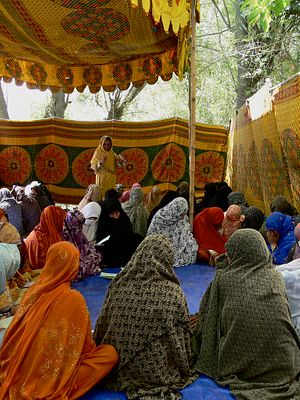In 2017, on the surface, much changed in Pakistan. Prime Minister Nawaz Sharif resigned amidst corruption charges. His resignation was followed by that of the law minister, Zahid Hamid, following significant protests. Yet under the surface remained the same challenges that Pakistan has always grappled with: an interfering army that continues to call the shots no matter who’s in charge, and religious fundamentalism. The latter led to Hamid’s resignation, as the government capitulated to a mob whose religious sensibilities had been offended.
Add to this mix another constant feature that has remained unchanged amidst all the upheaval in the country: the disadvantages faced by women. Successful democratic transitions may well be taking place in Pakistan, yet for poor and disadvantaged women, especially those from rural areas, these changes have bypassed them. More women in Pakistan are murdered at the hands of close family members for supposed immoral behavior than Pakistani civilians are killed by terrorism.
Matters were made worse in 2017 by the Pakistani government.
Early in 2017 the government decided that the solution to Pakistan’s inefficient, politicized, and backlogged judicial system, which has over a million cases still waiting to be decided on, was to provide constitutional cover to Pakistan’s centuries old jirga system, a tribal system of justice. The government believes the jirgas will offer swift and speedy justice to those who are marginalized, poor, and unable to access formal justice. Yet if the government of Pakistan was hoping to show concern for the poor and marginalized, especially women, it has done the total opposite and exposed its own weaknesses.
The jirga system is entirely at odds with Pakistan’s constitution, as well as with the conscience of any human being demanding equality before the law. Jirgas operate on centuries-old codes of honor and their tribal code considers women to be property. It was a jirga that decided in 2002 that Mukhtar Mai was to be gang-raped as recompense for a sexual assault committed by her brother. It was also a jirga that ruled that two teenage lovers, Bakht Jan, 15, and her boyfriend Rehman, 17, were to be electrocuted to death for bringing dishonor to their community.
Undoubtedly, there will be those who claim that these are but extreme examples, whilst many jirgas have been able to offer justice to those who would otherwise have lacked the means to redress their grievances. Yet developing parallel legal structures only undermines confidence in the state in the long term.
The Pakistani government was moved more out of necessity and self interest than it was by any genuine concerns over its citizens seeking timely resolutions to disputes. As a means of resolving its governance problems, the government has come to the view that tribal areas should be integrated into Khyber Pakhtunkhwa province. As part of this deal, it has been unwilling to rock the boat too much and happy to keep the jirga system of dispute resolution that it has come to believe is an integral feature of tribal provinces.
The present administration has also sought to curry favor with religious hardliners in the country in order to increase its legitimacy, meaning it was even more reluctant to upset its hardline base.
So when the government decided to pass the Alternate Dispute Resolution (ADR) Bill in 2017, it did so knowing fully well that the system of jirgas would gain added legitimacy. The bill makes some minor changes, allowing the government for example to appoint “neutrals” to each jirga, who must approve their verdicts. Yet these “neutrals,” consisting of retired judges and religious scholars, are more likely than not to be men with conservative principles. So much for neutrals. The bill itself, which will undoubtedly have a major impact on the lives of women across the country, was voted on by only 23 out of the 342 members of the lower house.
What is all the more worrying is the manner in which the mainstreaming of such misogyny by Pakistan has gone unchecked by its biggest aid donors. The United Kingdom’s Department for International Development, for example, has sought to better understand the jirga system, funding ADR capacity building in tribal areas. Now that Pakistan is a democracy, some have complacently come to believe that progressive policies will automatically be pursued — wishful thinking in a country where minorities have been prosecuted by an all-too-compliant state, afraid of tackling intolerance head on.
Many both inside and outside Pakistan have come to believe that unequal treatment for poor and disadvantaged Pakistani women is a price worth paying for stability and harmony in a country seen as pivotal in the fight against extremism. Yet the world must be clear that this cannot be so. The very women who have paid the heaviest of prices under rising extremism and militancy, from attacks on schools to coping with displacement, must have their rights and concerns placed at the forefront in Pakistan.
Basit Mahmood is a U.K.-based journalist. He tweets at @BasitMahmood91.

































